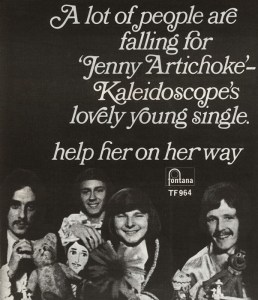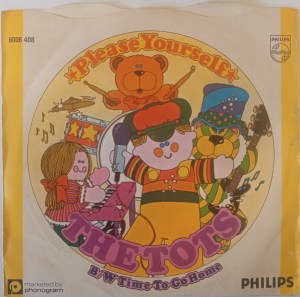‘The Toytown Sound’ has only briefly been referenced before – the five-disc ‘A Trip to Towntown’ (released 2007) which was curated by members of the Marmalade Skies website. Sadly, it was somewhat lost in the tidal wave of psychedelic compilations released in the late 90s and 2000s but it was so skilfully done that it even came with a manifesto of sorts:
In keeping with the theme of Marmalade Skies, only songs recorded in 1966 or later were included. In an effort to keep ‘The Diary of Horace Wimp’ off the list, we’ve not allowed any song after 1974.
▪ In general Toytown songs should be at least one of the following: light, bouncy, jangly, slightly off-key or slightly out of whack.
▪ There must be a prevailing sense of humour. No message songs or anything overly earnest.
▪ Children’s stories, children’s voices or songs about children (especially scared children) were bound to get in.
▪ Songs about toys, toy lands, toy towns and trains are right in.
▪ Songs with the word “little” in the title got very serious consideration.
▪ Cookies and other confections mentioned in songs pleased us very much
▪ Animals are good Toytown subjects, especially if they are doing something funny (like hanging around in baskets or eating people).
▪ Songs about people qualify, especially if the people in question are somewhat out of touch with reality, have quaint jobs or are someone’s Auntie.
▪ Concept albums and their creators (such as the Small Faces) seem to fit other genres better so we left them off this list.
▪ Lastly, the Beatles and Pink Floyd were disqualified. We recognize that both Paul McCartney and Syd Barrett are two of the founding fathers of Toytown but including them in our list seemed too obvious.
‘Climb Aboard my Roundabout!’ brings distinctly mundane British characters living in fabulous psychedelic worlds – or, conversely, astonishing, distinctly British characters in mundane worlds. Think, “For the Benefit of Mr Kite” sonically or even TV shows like ‘The Magic Roundabout’ and ‘Camberwick Green,’ visually. Three discs and over four hours of whirligig funfair sounds married with chirpy lyrics and often an underlying melancholy. Everyone is having a marvellous time but you might get thrown off the Waltzer or have your skull cracked open if you don’t look where you’re going near the coconut shy. On the surface absolutely throwaway froth but usually groaning with elaborate orchestrations and arrangements, the odd juxtaposition of candyfloss dreams married with tattered balloons in the gutter make this one of the most intriguing and – perhaps – important documents of British pop music from the era.

The set kicks off with The Idle Race’s “The Skeleton and the Roundabout”, the unmistakable tones and touch of a pre-Electric Light Ochestra Jeff Lynn in full effect. An unpopular funfair sees its owner wasting away to a ‘skellington’, only to find gainful employment on the ghost train – already a great set-up, it reaches Toytown nirvana by ending with him being sacked for gaining weight. In a little over two minutes, the entire world of the Toytown Sound is laid bare – light-hearted yet with an air of fatalism. Have your fun while you can – where American counterparts may promise a lifetime of sailing down a chocolate river, the British always had one eye on disaster.
Kaleidoscope’s “Jenny Artichoke” is similarly brief, though with less of a tall tale, seeing Jenny living on a boat and not knowing much, not caring about people but “she was, oh, so nice to me“. Without the irresistable strum-along bounce of the melody, this could have been a VERY different track. Like so many at this time, despite strong radio play and proving emminently hummable, it didn’t chart. Fruit Machine appear with a cover of Harry Nilsson’s “Cuddly Toy”, a thinly-veiled song about a promiscuous girl who deserves all she gets:
You’re not the only cherry delightThat was left in the nightAnd gave up without a fight, yeah
If it’s any consolation to Fruit Machine, The Monkees also covered it – both bands claiming they took it at face value and considered it the fate of a teddy bear, not a girl involved in Hell’s Angel’s gangbangs. This is a world away from the suggestive bubblegum pop of The Archies and sees the funfair as being populated by far more than wide-eyes innocents.


One thing is for certain – you need a strong constitution to listen to the three discs in one go. John Carter and Mickey Keen’s “Mr Light” features a chuckling squirrel; some sped-up voices masquerading as children on Kidrock’s “Ice Cream Man” (to paraphrase an exasperated Scottish theatre-goer at a Mike & Bernie Winters’ show – “fucking hell, there’s two of ’em!) and characters called “Ebeneezer Beaver” (The Mirage). One song looms large over the project – Keith West’s, “Excerpt from ‘A Teenage Opera'”. Both its success and Wirtz’s production have more influence on many of the artists featured than The Beatles, The Kinks or any other band. Its positioning at the end rather than the beginning of the disc is judged very well – what you’ve heard might seem like throwaway nonesense but let’s not forget – for a brief period, this was a huge opportunity to throw the kitchen sink at pop music and find a young, curious audience.

Disc two reinforces how artists from across the musical spectrum tried their hands at recording songs about people with daft names (disc two highlights – Mr Kipling; Cellophane Mary Jane and…Flossie Fillett!) and circus jollity. Amborose Slade – later, of course, just Slade, contribute “Knocking Nails into my House”, a Jeff Lynn composition (this album certainly pays his next gas bill) which sees Dave Hill struggling to stop hitting power chords and Noddy barely able to contain an ear-bruising bellow but they just about manage it. Bowie returns with “Uncle Arthur”, fitting the Toytown brief with a relative in conflict with the modern world but standing out, despite the oboe and hand-claps, through the vocal. The subject and overall daftness cannot conceal Bowie’s unique delivery, even on his first album.

Timon’s “The Bitter Thoughts of Little Jane” may well feature half of Led Zeppelin – John Paul Jones is certainly there; Jimmy Page possibly. Regardless, this is ultra-Toytown – twinkling, candy-coloured melodies and a sweetly sung lyric about…a disturbed young girl who tortures her friends. I wouldn’t ordinarily do this but have a look here:



